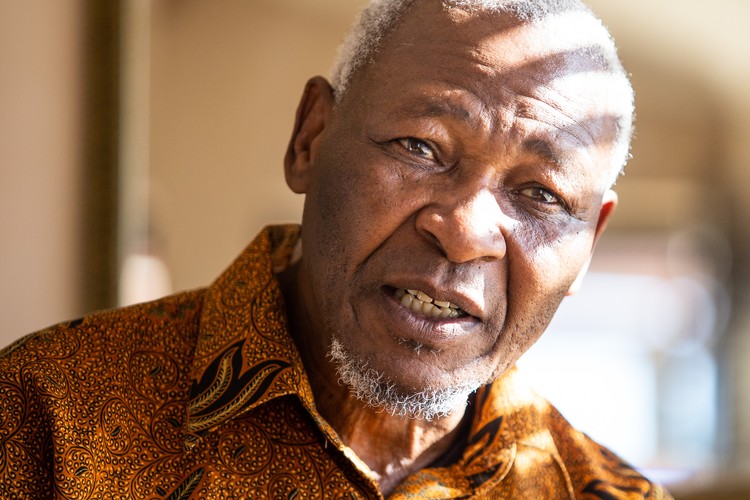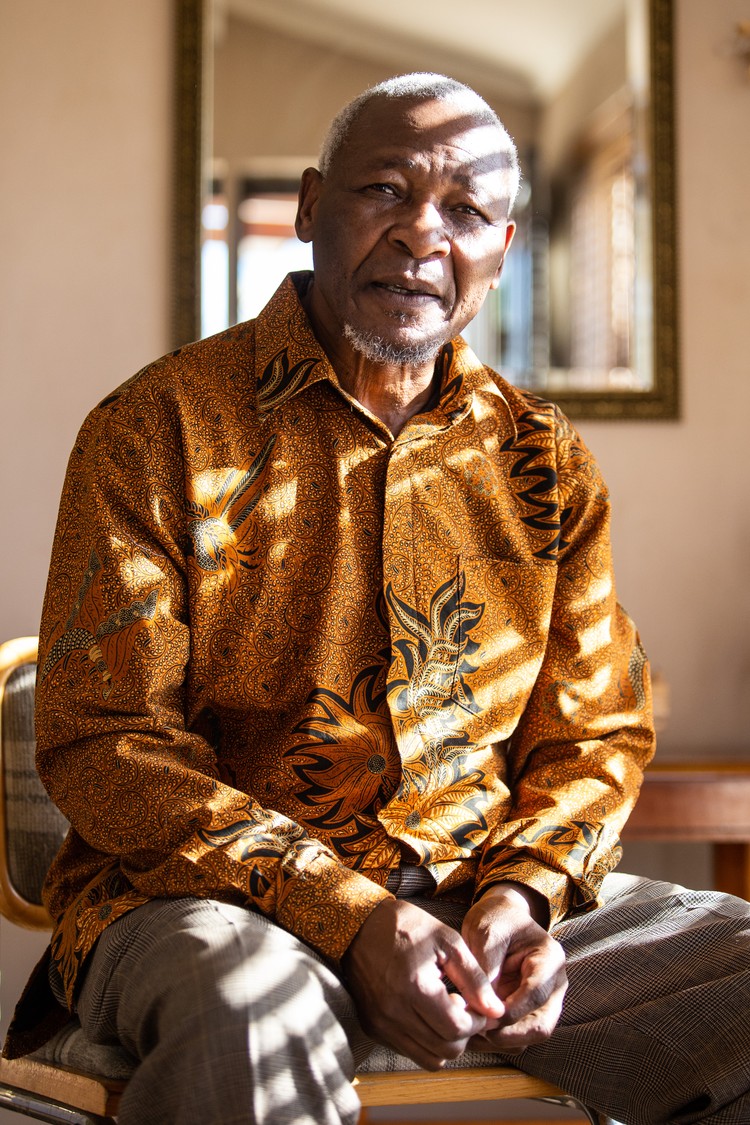Struggle activist denied his pension
Rose Sonto was banned, detained and jailed under apartheid. But the Special Pensions Appeal Board could find no trace of his activism. Now the Public Protector has ordered a review
Mzunani “Rose” Sonto, who was banned and imprisoned for anti-apartheid activism, has been denied his Special Pension since 2017. Now the Public Protector has called for a review of that decision. Photo: Ashraf Hendricks
-
Anti-apartheid activist Mzunani “Rose” Sonto was awarded a Special Pension in 2004, based on five years of struggle activity. Special pensions are awarded to those who could not save for their own pensions because of their activism.
-
In 2014 he applied to the Special Pensions Appeal Board to have the pension increased, because he said he had been an activist for 12 years, not five.
-
Instead of increasing it, the Board cancelled his pension completely. They said they could find no record of his activism, though he fought and was imprisoned alongside well-known people including former Finance Minister Trevor Manuel.
-
Sonto applied to the Public Protector, who found that the Board had erred and asked the Minister of Finance to apologise to Sonto and to set up a judicial review of the Board’s decision.
The struggle leader who drove Nelson Mandela away from Victor Verster Prison in Paarl has been without his pension for nearly five years.
Anti-apartheid activist and former MP Mzunani Roseberry “Rose” Sonto applied in 2014 to have his Special Pension increased to reflect all the years he had fought apartheid. Instead, it was cancelled, and since July 2017 he has been without it.
Now the Public Protector, Busisiwe Mkhwebane, has told the Minister of Finance, who holds ultimate responsibility for Special Pensions, to look again at Sonto’s case.
Special Pensions are awarded, under the Special Pensions Act, to people “who made sacrifices or served the public interest in establishing a democratic constitutional order in South Africa”. The pensions are paid for by the National Treasury and administered by the Government Pensions Administration Agency (GPAA). The pensions are awarded to people who could not save for their own pensions because of their activism, even if they were employed at the time.
Sonto applied in 2001, and in 2004 was awarded a Special Pension for five years of pensionable service by the Special Pensions Board. Ten years later, in July 2014, Sonto lodged an appeal with the Special Pensions Appeal Board, which is appointed by the Minister of Finance. He said his pension was based on five years of service, from 1985 to 1990, but he had in fact served for 12 years in total between 1971 and 1990.
But Sonto did not get his pension increased. Instead his Special Pension was set aside in July 2017 by the Special Pensions Appeal Board. The Board claimed that there wasn’t enough evidence that Sonto was a full-time anti-apartheid activist. There was no evidence, the Board said, that he had been banned or restricted, imprisoned or detained for politically motivated offences.
This was news to Sonto. GroundUp spoke to people who know his struggle activism, who were also shocked at Special Pension’s decision.
Sonto was a leader in the United Democratic Front, an underground operative, and president of the Cape Youth Congress, a precursor to the ANC Youth League.
He told GroundUp that he had been arrested a number of times for political offences in the 1980s, and had been imprisoned several times in Pollsmoor and Victor Verster prisons. His colleagues, and sometimes cellmates, included, among others, former Minister of Finance Trevor Manuel.
Sonto told GroundUp that the first time he saw his daughter Anna was while he was detained at Victor Verster prison.
“I drove Madiba out of Victor Verster prison,” said Sonto in an interview with GroundUp. “The very organisation that sent me to Parliament is denying knowing me now.”
Sonto was a member of ANC delegations that negotiated with the apartheid government in the early 1990s.
Later, Sonto was to serve as Western Cape chairperson for the South African National Civic Organisation (SANCO), was a member of the Western Cape Provincial Legislature after the 1994 elections, and was a member of the National Assembly between 2010 and 2014 for the ANC, retiring the same year.
Sonto said that the Appeal Board hadn’t considered the considerable evidence from that time, or interviewed people who could corroborate his story. He had photos and articles, records of arrest, and testimony from those with whom he had been imprisoned, including Manuel.
He sent a letter of appeal to the Appeal Board in October 2018, with proof of his imprisonment, names of people with whom he had been in jail and/or with whom he had worked in the struggle, and press clippings confirming his political activity.
But this letter fell on deaf ears.
Not long after his Special Pension was removed, his wife Nobom suffered a stroke. Nobom was also a struggle activist, and was detained on a number of occasions, even while pregnant.
“The decision of the board was a travesty of justice, trampling on my human rights and constitutional rights,” Sonto told GroundUp. “The reasoning behind their decision was shocking. They said they had done their own research and questioned people like Trevor Manuel - and found that nobody knows me, and had gone to all prisons and found no evidence I was detained. They said for these reasons my file was empty - it consists only of my application, one version of my story.”
Sonto lodged a complaint in May 2019 with the Public Protector, which began its investigations later that year.
In a November 2019 letter to the Public Protector, the Government Pensions Administration Agency said her office did not have jurisdiction to investigate complaints about the decisions of the Appeal Board. Instead, the agency said, Sonto should instead seek a review of the decision in the High Court.
“But how could I pay for a senior counsel?” Sonto asked GroundUp.
Fortunately for him, the Public Protector hung onto the case, deciding that her office did indeed have jurisdiction to investigate because the Appeal Board is an organ of state.
Mkhwebane asked for the files from the original decision to award Sonto a pension, in 2004, but received a folder with no useful information in it: no decision of the Board, no record of interviews, no proof of any investigation. The decision to award the pension had been based on the evidence before the Board at the time, she was told.
When the Public Protector’s investigators asked the Government Pensions Administration Agency’s manager of Special Pensions Appeals about this, they were told that “there are quite a lot of files with nothing in them”.
The Public Protector found that the Appeal Board’s decision to set aside Sonto’s pension was not in line with the law. Specifically, she said his appeal was too late to have been considered. In terms of the legislation governing special pensions, applicants have 60 days to lodge an appeal to the pension board’s decision. Sonto lodged his appeal ten years later. Mkwebane found that the Appeal Board should not have even considered his appeal application, let alone take the decision to stop Sonto’s pension.
She said the Minister of Finance should set in motion a judicial review of the Appeal Board’s decision within thirty working days. The Minister should also apologise to Sonto, within sixty working days. The Minister should report to the Public Protector within sixty working days on action taken.
“Treasury should speed up this process and not hide behind the fact that Special Pensions applicants do not have money to take them to court,” Sonto told GroundUp. ”It took Special Pensions more than five years to reply to my letter - it just shows that our government doesn’t care for its own people.”
GroundUp approached the Minister of Finance’s media team on Monday for comment. Mfuneko Toyana, spokesperson for the Minister of Finance, said, “The National Treasury is still processing the matter and will communicate its response in due course.”
The evidence the Board couldn’t find
The Special Pensions Appeal Board found no evidence of Sonto’s anti-apartheid credentials. Yet it is very easy to find. He was a very prominent activist, particularly in the 1980s in Cape Town.
There are Sonto’s own accounts, as in this interview with David Bailey: https://www.youtube.com/watch?v=FIIBDbXlZ1k
There are photos of Sonto with fellow activists after their release from detention, such as those found in former Western Cape UDF president Zollie Malindi’s memoir. In this, Malindi also describes a number of occasions in the 1980s when he was detained with Sonto.
There is this historical brief on the groundbreaking Cape Youth Congress, which he helped to found in 1983, and led as President from 1984: https://www.sahistory.org.za/article/cape-youth-congress-cayco
Here is an issue of Grassroots newspaper from 1987. On page 3, a story about detainees, Sonto is mentioned as a person that is still detained due to political activities, along with people like Ebrahim Rasool, NomaIndia Mfeketo, Malindi, and Trevor Manuel.
There is this 1988 UDF pamphlet, which describes Sonto’s activism, detentions and banning.
Here is Sonto at the ANC’s 1990 regional congress: https://www.cvet.org.za/displayvideo.php?vid=207-784-412
Sonto was part of Madiba’s reception committee - he drove him away from Victor Vester prison. He is on the far left of this photo of Mandela and Winnie Madikizela-Mandela walking away from the jail.
Here he is, on the front row, next to Cyril Ramaphosa - May 1990, part of an ANC delegation, outside Archbishop Desmond Tutu’s house, after a public meeting between the white government and the liberation movement (led by the ANC).
Here is Sonto, alongside Xoliswa Sibeko and Virginia Engel, on the eve of the 1994 elections.
This passage, from a 1996 edition of the ANC’s magazine Mayibuye describes Sonto’s vital role as a youth activist in the late 1970s and early 1980s:
“In response to growing youth unemployment in the early 80’s, COSAS at its 1981 Congress adopted a resolution calling for the formation of Youth Congresses in order to ensure the mobilisation of youth who were not in school. During the same period it also influenced AZASO, an organisation of university students formed in 1979, to shed its black consciousness ideology and to move closer to the Congress movement. When the UDF was formed in 1983, COSAS, NUSAS and AZASO formed an alliance as the progressive student movement.
Following the resolution of COSAS, youth congresses mushroomed throughout the country, in particular in response to the call from the ANC to “Make the country ungovernable, make apartheid unworkable.” A national committee was set up to work towards the launch of a National Youth Organisation. Members of the NYO committee included people such as Deacon Mate, Aleck Nchabeleng, Peter Mokaba, Stanza Bopape, Obed Bapela, Dan Motsitsi, David Abrahamse, Rose Sonto, Cassel Mathale and Frans Mohlala.”
Support independent journalism
Donate using Payfast

Don't miss out on the latest news
We respect your privacy, and promise we won't spam you.
Next: Young woman’s dream of becoming an architect crushed in her battle to get asylum
Previous: Some Durban flood victims have been moved four times
© 2022 GroundUp. This article is licensed under a Creative Commons Attribution-NoDerivatives 4.0 International License.
You may republish this article, so long as you credit the authors and GroundUp, and do not change the text. Please include a link back to the original article.
We put an invisible pixel in the article so that we can count traffic to republishers. All analytics tools are solely on our servers. We do not give our logs to any third party. Logs are deleted after two weeks. We do not use any IP address identifying information except to count regional traffic. We are solely interested in counting hits, not tracking users. If you republish, please do not delete the invisible pixel.


